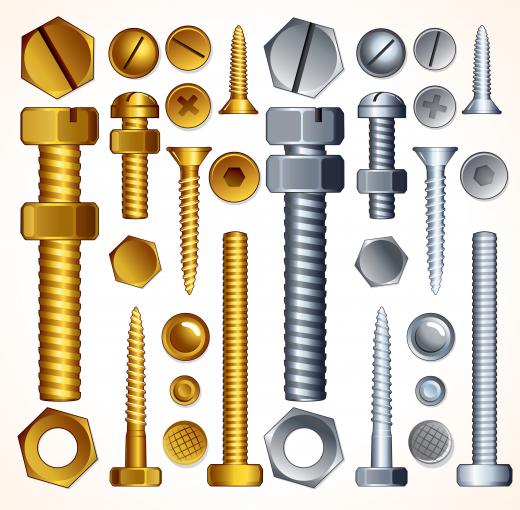An aluminum bolt is a cylindrical fastener made from strong and lightweight aluminum metal. A narrow section on each aluminum bolt is usually either partially or entirely threaded with parallel grooves. Aluminum bolts are commonly used to secure parts in a wide variety of mechanical and electronic applications. The aluminum bolt is generally screwed into a threaded hole or attached with an aluminum nut on the protruding threaded end. Torque wrenches are sometimes used to precisely tighten aluminum bolts without causing them any damage.
Outdoor applications are an ideal place for aluminum bolts and nuts. Devices intended to regularly contact or be submersed in water are often connected with aluminum bolts. Aluminum does not rust in the presence of moisture like iron-based, or ferrous, metal bolts. Bolts, nuts, and washers made from aluminum are available in a wide variety of sizes to replace less durable fasteners in a variety of projects. The slight cost increase of an aluminum bolt is generally offset by its long period of usefulness.

Many aluminum bolts are anodized to give them color and seal them with a protective outer layer. An aluminum bolt is attached to a polarized electrical circuit as the anode, or electrical current vehicle. The anodizing process begins as the electricity passes through the aluminum bolt and speeds surface oxidation. Aluminum does not flake off and expose a new vulnerable surfaces after oxidation like most iron alloys. Colored sealants adhere to the porous oxidized surface of the aluminum and actually strengthen the bolt.

Anodized aluminum bolts offer attachment strength with very little weight contribution. Vehicles are able to run more efficiently as unnecessary weight is eliminated. Replacing standard bolts with compatible aluminum versions can noticeably reduce the weight on aircraft, land vehicles, and watercraft. Sets of colorful aluminum bolts can add a personalized accent to a favorite piece of machinery. A properly installed aluminum bolt will hold for years without the need for replacement.
A torque is often employed to secure an aluminum bolt without over tightening. Torque is a measurement of rotational force on an object. Many torque wrenches have preset or adjustable torque setting to control the tightness of bolts. A common ratchet or wrench can also be used to install aluminum bolts, but most commercial builds prefer the reliability of a torque wrench. Bolts are customarily installed quickly by hand before the torque wrench is used to create uniform tension.
